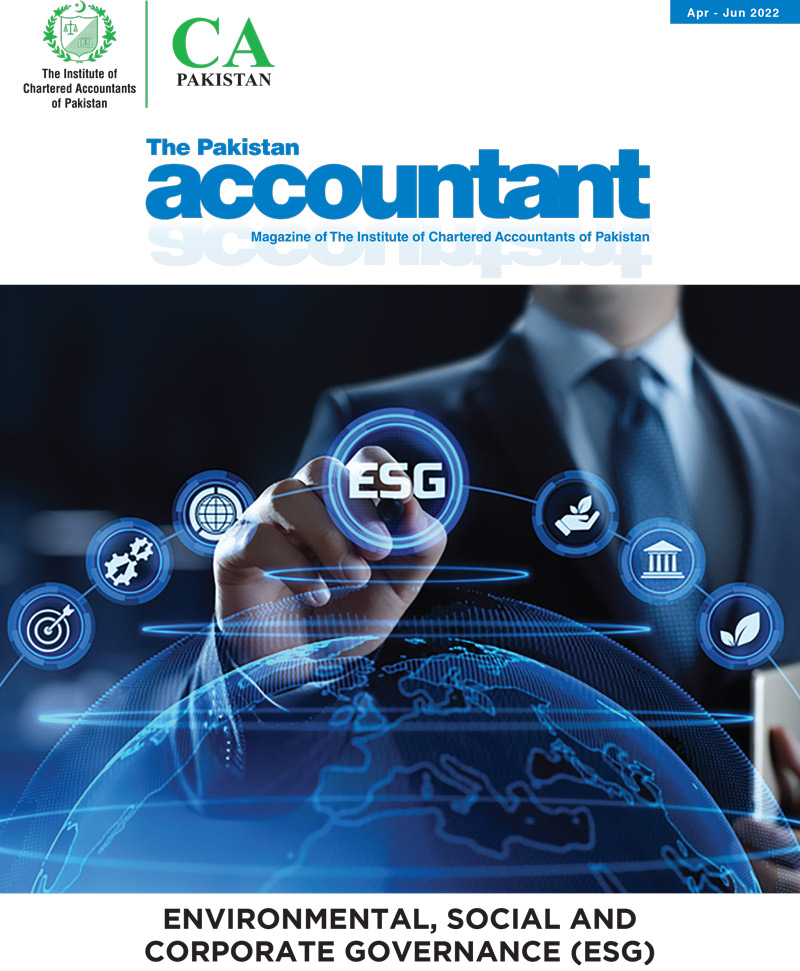Modern times have brought about such sophistication in investment decisions that encompass around much more than lone “profit motive” for conscious investors.
“Enviro-Socio-Governance” (ESG), are the core elements at heart, for preliminary screening process employed by investors acting responsibly, that define what boxes need a must check, before assigning a prospective investment, the “good-to-go” tag. In 2021, US witnessed a whopping $5 trillion increase in investors’ assets hand-picked using this responsible approach. Moreover, companies have come forward in the race to lead from front, as the most ESG compliant businesses, to foster their market repute and ultimately boost market capitalization through sensible gain in stock value. Interestingly, one third of all the assets that are being professionally managed globally, are considered to be ESG compliant, totaling roughly to $30 trillion in 2021.
Before we step forward and analyze this approach, it is essential to shed light upon each of the components of ESG criteria. While these appear to be more subjective in discussion, moves are underway to come up with a more objective appraisal framework in order to make the results comparable and fair.
Environmental orientation
This is the extent to which a company’s values and operations are supportive and considerate of favorable or at least, neutral environmental impact. Throughout the value chain, environmental sustainability of actions and decisions is sought out.
There are various issues need to be addressed under this protocol, including but not limited to:
- Waste from operations
- Impact on biodiversity
- Conservation of natural resources and habitat
- Water and/or air pollution
“Enviro-Socio-Governance” (ESG), are the core elements at heart, for preliminary screening process employed by investors acting responsibly, that define what boxes need a must check, before assigning a prospective investment.
Net Zero is an integral recent trending initiative that has been introduced and adapted by most responsive and concerned nations. It is a pact that encourages elimination of greenhouse gases to conserve natural climate and prevent global warming, latest by year 2050. This can be attained largely by switching to wind, solar and other renewable sources of energy and scrapping out use of polluting energy sources such as coal, oil fired and other such means.
Social Side
This comprises of a wide ambit of relationships and interactions that the company comes across, ranging from employees to general community. When we wish to analyze this aspect of ESG, the relationship between the company and its working class would be just spot on. It would be sensible enough to ascertain:
- fairness, generosity and competitiveness of remuneration being offered by the company to its workers, in contrast to what competitors are offering as well as what is being offered under best industry practices.
- Whether any non-monetary benefits are on cards besides basic renumeration and perks, that could really make a difference. This can include offering fitness activities on premises or providing free and premium food facility or any other unique and appreciable offerings.
- The level of autonomy and professionalism in work practices that promote a culture of merit and transparency.
- Safe and secure business practices are there to promote and health and wellness of workforce.
- Equal opportunity employment opportunities and turnover etc.
ESG focused investors hold a disparity in orientation with respect to conventional investment minds, as they want much more than bare profits.
On a wider community level, more concerning factors would include:
- How well has the company defined its CSR policy and to what extent is it pursuing such objectives. This includes contributions towards noble and charitable causes as well the stance towards protection of general human rights.
- The perfection in customer relationship management and interaction, duly taking note of its market reputation.
- Sensible vendor selection and retention criteria in line with ESG protocols.
A spotlight on just a few of many aspects of socio-factors reassures how well the company needs to perform in terms of social interactions, to secure a decent
- ESG ranking.
- Good governance
Finally, the third and equally important element of ESG structure is “governance”. This implies, how well the governing executives of company have taken charge of their fiduciary role in light of latest regulations and standards, to secure the interests of all stakeholders.
The term good governance has a far stretching scope that ranges from (i) accuracy and transparency in accounting and reporting, (ii) provision of fair opportunity to all shareholders; for instance, for casting vote over key matters involving strategic policy and decision making, among many other important roles. ESG investor seek an inclusive and harmonized working arrangement between executives and board members of the company, where threats such as conflict of interest or other potential corporate misconducts are mitigated.
The motive for having in place this sound control mechanism is to aid the prevention of a corporate fraud or scandal from coming into being.
The conventional side
It is pertinent to mention that there is no free bargain in this world, everything comes with a price tag. Although this “values” oriented approach sounds tempting, the critics however, have a contradicting viewpoint that essentially seeks consideration. The bottom-line for every business or investment is undeniably; return on investment, the sole purpose, intention or reason for being, whatever name it may acquire. As soon as we pull out additional yardsticks i.e., ESG metrics, it would mean there is no longer a single line of focus, we suddenly find ourself running after too many wants, any or all of which may or may not actually mean anything, after all, when it comes to wealth generation.
To better understand this conceptually, we can refer to Milton Friedman’s approach towards assessing an optimal investment, who believed firmly in considering the financial worth and profit earning capability of a company in this regard, while all expenses linked to fulfilling social responsibility are merely an unnecessary blow to real shareholder’s wealth.
Another point to ponder is how ESG criteria clearly rules out much of the companies that fail the basic criteria and resultantly, investors are deprived of such opportunities that actually have the potential to perform well, at least “financially”.
The new normal
Conversely, investors and companies supporting ESG perspective for decision making know quite well, the fact that rightful earning is not possibly the highest in short run although, it definitely goes a long way and maximizes the cumulative return in the long-run. According to latest studies, it has been observed that ESG compliant ventures, by virtue of being less risky, carry a lower discount rate matching the investors’ expectations, thus deliver higher returns.
The key takeaway here is that ESG focused investors hold a disparity in orientation with respect to conventional investment minds, as they want much more than bare profits.
Their real satisfaction lies with companies that act sensibly, leaving a positive social impact where it really matters and risk aversion through environmental and legal compliance while conserving the natural habitat for all. Therefore, even if the monetary return under this regime comes down, the
non-pecuniary returns would add up to so much more that investors perceive it a win-win situation, attaining psychic contentment themselves, by means of benefits accruing for the society as a whole. This proves that “values” matter more than “simply money”.
The way forward
To sum up this discussion, whether or not ESG oriented companies or investment portfolios deserve to carry the “good” tag or tend to offer optimum investment opportunities, remains subjective debate till date, while totally relying upon investors’ preference, perception and attitude. As young
investors start conquering the stock market with this new approach, it is inevitable to expect a paradigm shift in the way of doing and investing in businesses.














